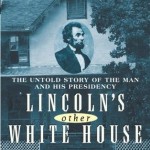 Abraham Lincoln lived in the White House from March 1861 until his assassination in April 1865. Or did he? In fact, he spent most of the summer months of 1862 through 1864 – about a quarter of his presidency – living in the Soldier’s Home. Author Elizabeth Smith Brownstein gives us a fascinating, as well as delightful, look at Lincoln’s Other White House.
Abraham Lincoln lived in the White House from March 1861 until his assassination in April 1865. Or did he? In fact, he spent most of the summer months of 1862 through 1864 – about a quarter of his presidency – living in the Soldier’s Home. Author Elizabeth Smith Brownstein gives us a fascinating, as well as delightful, look at Lincoln’s Other White House.
The book unfolds in two parts. The first part groups three chapters into a sort of preamble as Lincoln’s “long journey to the Soldier’s Home.” Here we find the history of the airy cottage originally belonging to the Riggs banking family but now transformed into a home for aging veterans. We also get a sense for why Lincoln was eager to escape to the home, both from the pressures of constant office seekers and from the diseases and smells permeating the capitol during the steamy summer months.
The second part is split into 15 chapters exploring a variety of issues and people Lincoln dealt with as the war raged outside his doors. Not all of the action takes place at the Soldier’s Home, but the home life is delicately interwoven throughout the stories. Brownstein brings us into the complexities of the Lincoln marriage, his interactions with various cabinet members and Generals, and the importance of his time at the Soldier’s Home during the development of the Emancipation Proclamation.
Along with discussions of Lincoln’s views on freedom and his interest in the tools of war are more unique insights. We see some of the poems on slavery that rose from the pens of such icons as Henry Wadsworth Longfellow, Herman Melville, John Greenleaf Whittier, and Walt Whitman. An occasional poet himself, no doubt Lincoln appreciated their ways with words. We also get a sense of Lincoln’s favorite storytellers, including the inimitable characters Petroleum V. Nasby, Artemus Ward, and Orpheus C. Kerr (a play on “office seeker”).
Brownstein’s writing is crisp and light. She covers a lot of territory as she hops in and out of key events and interrelationships during Lincoln’s time at the Soldier’s Home. I found it to be a delightful book indeed, and I highly recommend it to readers.
[Note: I read this book after Elizabeth Brownstein noticed that I had reviewed Matthew Pinsker’s book on the soldier’s home. I recommend both books as they provide different perspectives on Lincoln and the importance of his time there.]
David J. Kent is an avid Lincolnophile and the author of Tesla: The Wizard of Electricity. You can order a signed copy directly from me, download the ebook at barnesandnoble.com, and find hard copies exclusively at Barnes and Noble bookstores.
Follow me by subscribing by email on the home page. And feel free to “Like” my Facebook author’s page and connect on LinkedIn. Share with your friends using the buttons below.











Pingback: Book Review – Lincoln & Darwin: Shared Visions of Race, Science, and Religion by James Lander | Science Traveler
Pingback: A Writer’s Passing | Hot White Snow